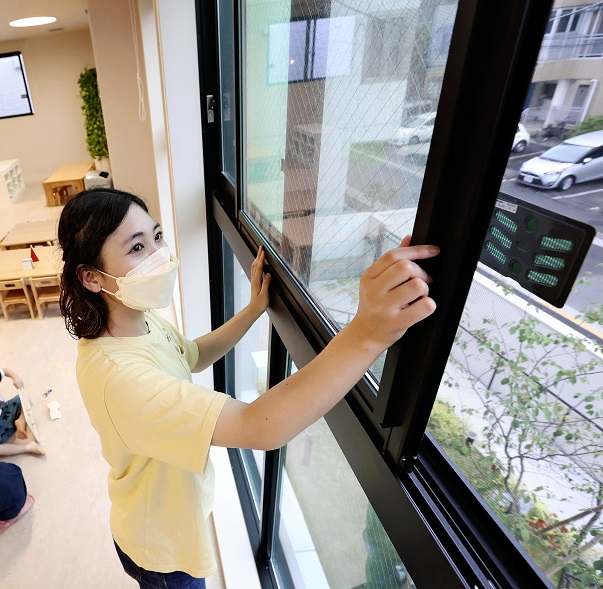
A childminder opens a window at Kasaihatsu Miraiiki Hoikuen nursery school in Edogawa Ward, Tokyo, on Aug. 4.
14:47 JST, August 14, 2022
A growing number of local governments no longer require nursery schools to identify people who have had close contact with coronavirus carriers.
The move is aimed at minimizing the impact on working parents amid the seventh wave of the novel coronavirus, and easing the burden on nursery schools and health centers that carry out virus carrier-identification work.
However, this approach also increases the risk of overlooking an infected person and creating a large-scale cluster, putting pressure on local government officials and childminders.
Forced to miss work
“There’s been a drop in the number of children who need to stay home,” said Yoshiko Baba, 55, director of Kasaihatsu Miraiiki Hoikuen, a licensed nursery school in Edogawa Ward, Tokyo, on Aug. 4. “I think this is a big deal for parents.”
On July 22, the Tokyo metropolitan government introduced a policy to stop identifying people at nursery schools who were close contacts with coronavirus carriers. In response, nursery schools in the ward stopped identifying and asking such people to stay home, even if an infected person was detected.
In late July, a child was found to be infected at Kasaihatsu Miraiiki Hoikuen, but staff merely notified guardians that somebody had the virus. “So far, we’ve had no clusters,” Baba said. “We hope to keep it that way until the seventh wave is contained.”
The Tokyo metropolitan government’s policy aims to reduce the number of parents forced to miss work due to having to care for children forced to stay home for being a close contact of an infected person. The policy also help avoids the closure of nursery schools while identifying close contacts and disinfecting school equipment.
According to the Tokyo metropolitan government, in the week ending Aug. 2, 40 nursery schools had suspended all or part of their operations, an almost 50% decrease from the previous week’s figure of 73.
Chiba and Hiroshima prefectures, as well as the cities of Yokohama, Kawasaki, Osaka, and Sapporo also have introduced similar policies.
The company that operates Kiitos nursery schools in Chiba Prefecture said childminders often spent more than half a day checking three days’ worth of surveillance camera footage from classrooms whenever an infected child was confirmed. A company official welcomed the new policy, saying, “It’s going to reduce the burden on childminders.”
Fears of closures
If nursery schools across the nation were forced to close due to infected children, social activities, including those of parents, would be severely affected. The Health, Labor, and Welfare Ministry has thus deemed it appropriate for the schools to stop identifying close contacts and has requested local governments to allow them to continue operating even if an infected person is detected.
In response, many municipalities have reviewed their criteria for nursery school closure. In March, Kyoto City switched to a policy of class closure rather than school closure when a single infected person is identified. In July, the city updated its policy so classes are only closed if two infected children are confirmed in the same class.
Nagoya, Kitakyushu, Wakayama and other cities also have eased their respective approaches.
According to the ministry, as of Aug. 4, 104 nursery schools nationwide were closed. Though the number of newly infected children under 10 was the highest ever, the number of closed facilities was only about 10% that of the sixth wave peak of 777 on Feb. 3.
Preventing clusters
However, nursery schools will have to close if a certain number of people become infected due to a cluster outbreak, or if a succession of daycare workers catch the virus.
Saitama City, which has stopped identifying close contacts, continues to identify “suspected close contacts” by working through a city checklist of child behaviors such as “not wearing a mask” and “being with a coronavirus carrier at lunch for 15 minutes or longer.” The city requests children who are “suspected close contacts” to refrain from attending nursery school for five days.
A city official said: “The main purpose behind not identifying close contacts is to reduce the burden on public health centers. We feel bad, but we ask parents for their cooperation.”
Top Articles in Society
-

Man Infected with Measles Reportedly Dined at Restaurant in Tokyo Station
-

Man Infected with Measles May Have Come in Contact with Many People in Tokyo, Went to Store, Restaurant Around When Symptoms Emerged
-

Woman with Measles Visited Hospital in Tokyo Multiple Times Before Being Diagnosed with Disease
-

Australian Woman Dies After Mishap on Ski Lift in Nagano Prefecture
-

Foreign Snowboarder in Serious Condition After Hanging in Midair from Chairlift in Nagano Prefecture
JN ACCESS RANKING
-

Japan PM Takaichi’s Cabinet Resigns en Masse
-

Japan Institute to Use Domestic Commercial Optical Lattice Clock to Set Japan Standard Time
-

Israeli Ambassador to Japan Speaks about Japan’s Role in the Reconstruction of Gaza
-

Man Infected with Measles Reportedly Dined at Restaurant in Tokyo Station
-

Videos Plagiarized, Reposted with False Subtitles Claiming ‘Ryukyu Belongs to China’; Anti-China False Information Also Posted in Japan






















